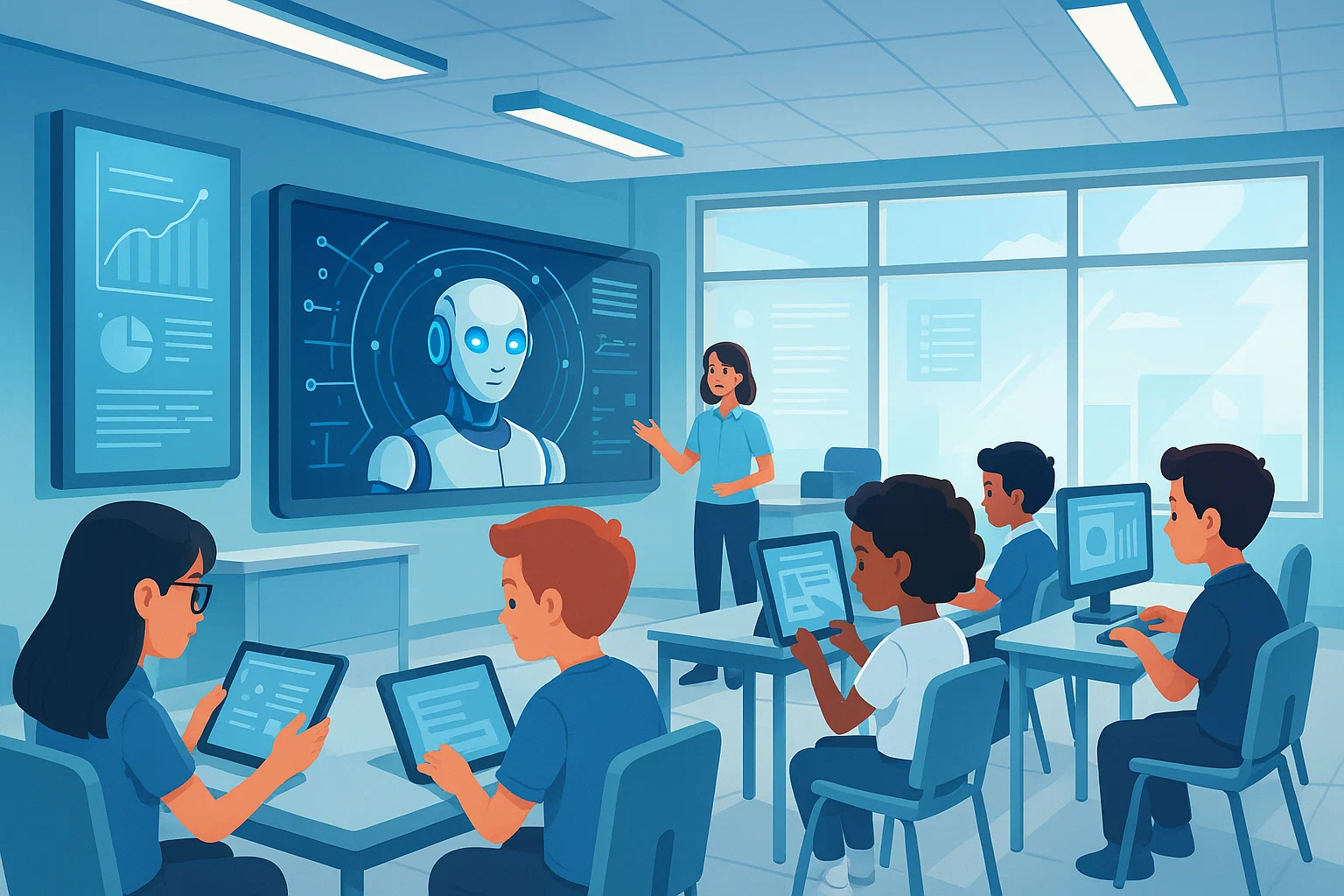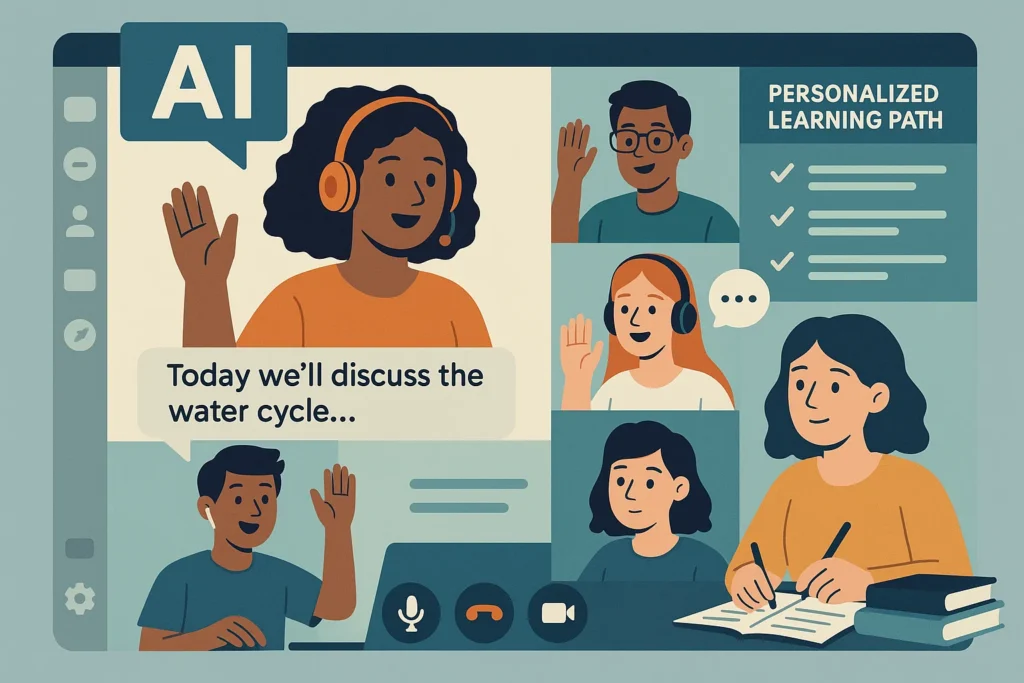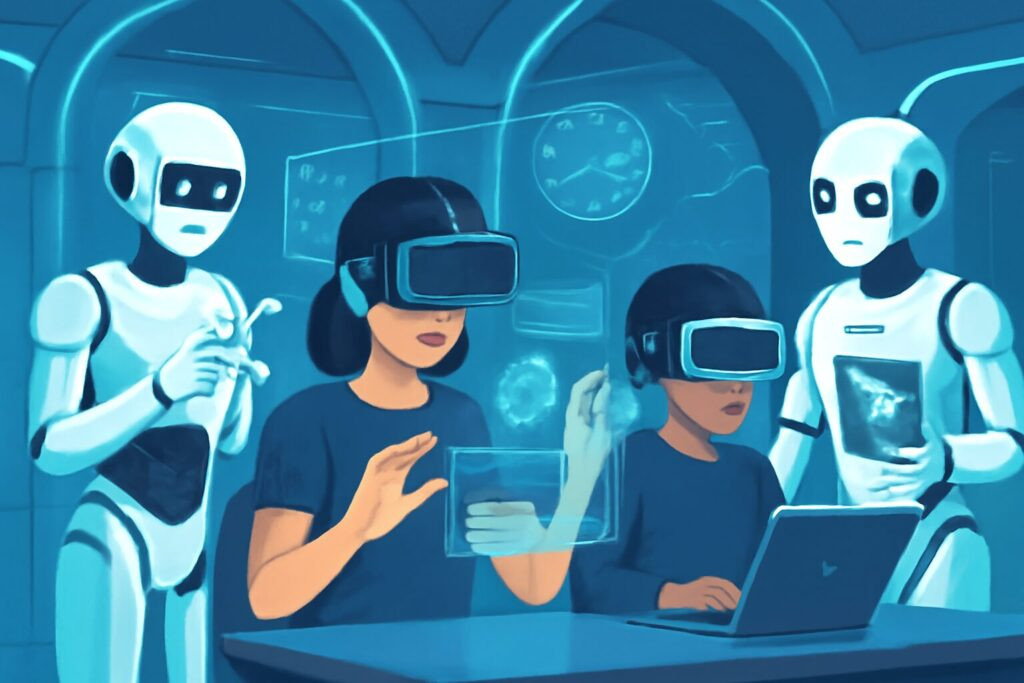AI in Education: Transforming the Future of Learning

Artificial intelligence (AI) is no longer just a futuristic concept—it’s revolutionizing industries, especially education. With the rapid advancements in technology, AI in education is reshaping how we learn, teach, and interact with knowledge. Whether you’re a student, teacher, or institution, understanding how AI can enhance education is crucial to staying ahead in this rapidly evolving landscape.
In this article, we’ll explore how AI is transforming education, its benefits, challenges, and real-world applications. We’ll also look at what the future of learning holds with AI’s ongoing impact. Let’s dive in!
The Role of AI in Education
AI in education refers to the use of intelligent systems to enhance learning and teaching. It helps in personalizing education, automating tasks, and improving the overall efficiency of the education system. But what exactly can AI do for education?
Personalized Learning
AI allows for personalized learning experiences by adapting content to suit each student’s needs. With AI, educational platforms can analyze students’ learning patterns and suggest customized learning paths. This is especially helpful for students with different learning styles, allowing them to learn at their own pace.
For example, platforms like Duolingo use AI to track your progress and adjust lessons to match your learning speed and retention.
Intelligent Tutoring Systems
AI-powered intelligent tutoring systems (ITS) can provide real-time feedback to students. These systems can analyze how a student is performing on assignments or tests and suggest improvements. It’s like having a tutor available 24/7 to guide students through difficult concepts.
Data-Driven Insights for Teachers
AI tools help teachers by providing them with data-driven insights on student performance. With real-time tracking and analytics, teachers can identify areas where students are struggling and make informed decisions about how to address gaps in learning.

How AI Enhances Teaching Efficiency
AI doesn’t just benefit students; it also makes the lives of educators easier. By automating time-consuming tasks, AI allows teachers to focus more on teaching rather than administrative duties.
Automated Grading Systems
With AI, grading can be automated, saving teachers hours each week. Many AI-based grading systems can assess essays, quizzes, and even assignments that require detailed feedback. By leveraging machine learning, these tools can grade assignments quickly and fairly, offering consistent results.
AI for Classroom Management
Classroom management becomes easier with AI tools that can track attendance, assess student engagement, and help create seating plans based on learning needs. This leaves teachers with more time to focus on delivering quality lessons rather than handling administrative tasks.
Real-World Applications of AI in Education
Let’s take a closer look at how AI is already being implemented in the education sector.
Virtual Classrooms
In response to the challenges brought by the COVID-19 pandemic, virtual classrooms became the norm. AI-powered platforms such as Zoom and Google Classroom have taken online learning to the next level by integrating features like real-time transcription, attendance tracking, and even sentiment analysis to gauge student participation.
AI in Adaptive Learning Platforms
Platforms like Khan Academy and Coursera use AI to offer personalized learning experiences. By analyzing students’ progress, these platforms dynamically adjust the difficulty level of exercises and quizzes to match the learner’s current skill set.
AI Chatbots for Student Support
AI-powered chatbots provide instant support to students by answering frequently asked questions and guiding them through resources. Institutions use chatbots to answer queries on a wide range of topics, from assignment deadlines to campus services.
The Benefits of AI in Education
Pros of AI in Education
- Personalized Learning: AI tailors lessons to individual learning needs, helping students learn better.
- Efficient Grading: Automated grading saves time and ensures consistent results.
- Data-Driven Decisions: Teachers get insights into student performance, helping them improve learning outcomes.
- Accessibility: AI helps students with disabilities by providing tools such as speech recognition and text-to-speech.

Cons of AI in Education
- Lack of Human Interaction: AI cannot replicate the emotional connection between teacher and student, which can affect motivation.
- Privacy Concerns: The use of AI often involves collecting and analyzing data, which raises privacy issues.
- Dependence on Technology: Overreliance on AI can lead to a lack of human judgment in decision-making processes.
Challenges of AI in Education
While the benefits are clear, there are several challenges to the widespread adoption of AI in education.
Digital Divide
Access to AI-driven education tools requires reliable internet access and modern devices. In areas with limited access to technology, students may fall behind, creating a digital divide that further exacerbates inequalities in education.
Teacher Training
For AI to be successfully integrated into classrooms, teachers must be properly trained. Many educators are still unfamiliar with AI tools, making it difficult for them to effectively implement AI in their teaching practices.
Ethical Concerns
The implementation of AI raises ethical concerns about data privacy and security. With AI systems collecting vast amounts of student data, ensuring that this information is handled responsibly is critical.
The Future of AI in Education
The future of AI in education is promising, with new technologies emerging to enhance learning experiences. In the coming years, we can expect more advanced AI-driven learning assistants, augmented reality (AR), and virtual reality (VR) applications that further enrich the learning environment.
AI will also play a significant role in shaping lifelong learning. As the job market evolves, individuals will need to upskill continuously. AI will help people learn new skills in a personalized and efficient manner, paving the way for a culture of lifelong learning.

Conclusion
AI in education is changing the way we learn and teach. From personalized learning experiences to smarter classroom management, AI is unlocking new possibilities for both students and educators. However, challenges such as the digital divide, teacher training, and ethical concerns must be addressed to ensure that AI’s full potential is realized in education.
The future of AI in education holds great promise, with technology continuing to evolve to meet the needs of a diverse global student body. Stay informed, embrace AI tools, and get ready to be part of the future of learning!

Similar Posts
The Role of Technology in Supporting Resilient Mental Health First Aiders
Top 5 Classroom 30x Games to Play to Improve Children’s Brain Health in 2025
How AI Turns Game Guides Into YouTube Videos in Minutes